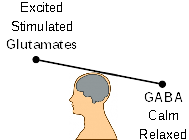"Glutamate in the cerebrospinal fluid (CSF) of OCD patients is increased and this provides evidence in support of the neurobiological models of OCD."
"Animal studies have shown that minocyclines decrease glutamate‐induced neurotoxicity."
In excitotoxicity, nerve cells suffer damage or death when the levels of otherwise necessary and safe neurotransmitters such as glutamate, aspartate, others.
Excess glutamate allows high levels of calcium ions (Ca2+) to enter the cell to hyper-stimulate the cell in a cascade evenb such as a heart attack.
Glutamate neurotoxicity relates to:
- Stroke
- cancers
- spinal cord injury,
- stroke
- traumatic brain injury
- hearing loss (through noise overexposure or ototoxicity)
- neurodegenerative diseases of the central nervous system
- multiple sclerosis
- Alzheimer's disease
- amyotrophic lateral sclerosis (ALS)
- Parkinson's disease
- alcoholism
- alcohol withdrawal
- hyper-ammonemia
- and especially over-rapid benzodiazepine withdrawal
- Huntington's disease.
- Cognitive‐behavioral disorders
Foods high in free glutamates
- sea salt
- sea weed
- kelp
- soy oil
- soy protein
Glatamate balance

---- Archived Free Access Article
Minocycline combination therapy with fluvoxamine in moderate‐to‐severe obsessive–compulsive disorder: A placebo‐controlled, double‐blind, randomized trial
Sophia Esalatmanesh MD
Zoha Abrishami MD
Atefeh Zeinoddini MD
Fatemeh Rahiminejad MD
Majid Sadeghi MD
Mohammad‐Reza Najarzadegan MD
… See all authors
First published: 04 August 2016
https://doi.org/10.1111/pcn.12430
Abstract
Aim
Several lines of evidence implicate glutamatergic dysfunction in the pathophysiology of obsessive–compulsive disorder (OCD), presenting this neurotransmitter as a target for the development of novel pharmacotherapy. The objective of this study was to assess the efficacy of minocycline as an augmentative agent to fluvoxamine in the treatment of patients with OCD.
Methods
One hundred and two patients with the diagnosis of moderate‐to‐severe OCD were recruited to this study. A randomized double‐blind trial was designed and patients received either L‐carnosine or placebo as adjuvant to fluvoxamine for 10 weeks. The patients randomly received either minocycline 100 mg twice per day or placebo for 10 weeks. All patients received fluvoxamine (100 mg/day) for the first 4 weeks, followed by 200 mg/day for the rest of the trial, regardless of their treatment groups. Participants were evaluated using the Yale–Brown Obsessive Compulsive Scale (Y‐BOCS). The main outcome measure was to assess the efficacy of minocycline in improving the OCD symptoms.
Results
General linear model repeated measures demonstrated significant effect for time × treatment interaction on the Y‐BOCS total scores, F(1.49, 137.93) = 7.1, P = 0.003, and Y‐BOCS Obsession subscale score, F(1.54, 141.94) = 9.72, P = 0.001, and near significant effect for the Y‐BOCS Compulsion subscale score, F(1.27, 117.47) = 2.92, P = 0.08. A significantly greater rate of partial and complete response was observed in the minocycline group (P < 0.001). The frequency of side‐effects was not significantly different between the treatment arms.
Conclusion
The results of this study suggest that minocycline could be a tolerable and effective adjuvant in the management of patients with OCD.